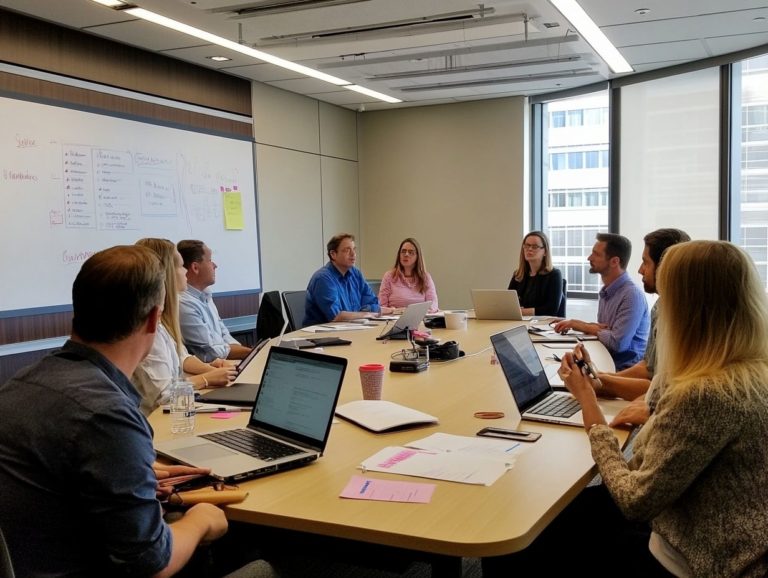What Is the Future of Corporate Training?
In today s fast-paced business environment, corporate training has significantly transformed. It’s moving away from traditional methods to embrace modern, innovative approaches.
This article delves into the evolving paradigms of corporate training. It emphasizes the crucial benefits for enhancing employee performance and enriching company culture.
You ll discover current trends, including the integration of technology and an increased focus on soft skills. We will also consider the future challenges organizations face in adapting to the changing needs of the workforce.
Explore with us what lies ahead for corporate training. Discover how it can play a pivotal role in shaping the success of your business.
Contents
- Key Takeaways:
- The Evolution of Corporate Training
- The Benefits of Corporate Training
- Current Trends in Corporate Training
- The Future of Corporate Training
- Challenges and Solutions for the Future
- Frequently Asked Questions
- What is the future of corporate training?
- How will technology impact corporate training in the future?
- Will corporate training become more flexible in the future?
- What role will data play in the future of corporate training?
- How will the future of corporate training support ongoing learning?
- What impact will the future of corporate training have on employee engagement and retention?
Key Takeaways:

- The future of corporate training is all about modern methods that leverage technology and focus on soft skills.
- Effective training boosts employee performance and keeps your team engaged and happy!
- To stay ahead, companies must adapt training to meet evolving workforce needs and tech advances.
The Evolution of Corporate Training
The evolution of corporate training has transformed dramatically. It is moving from traditional methods to modern approaches that fully embrace technological advancements and the diverse needs of today s workforce.
Organizations are increasingly adopting strategies that weave in technology like artificial intelligence, which is technology that mimics human thought processes, virtual reality, and augmented reality. These create hands-on learning experiences designed to elevate employee skills and boost engagement.
As the hybrid workforce becomes more common, embracing flexible training solutions like remote training and gamification is essential. This helps address skills gaps and nurture a culture of continuous learning.
Traditional Methods vs. Modern Approaches
Traditional methods of corporate training often relied on in-person workshops and seminars. These can feel rigid and inefficient compared to today s digital solutions.
The shift to technology-driven platforms has made training more accessible and customized. By embracing online courses and virtual training sessions, you can accommodate various schedules and learning styles, ensuring everyone has a chance to thrive.
This flexibility allows engagement with content at your own pace. It leads to better retention of information.
Plus, the integration of collaboration tools enables teams to connect and share insights. This fosters a culture of continuous learning.
As a result, modern training solutions enhance efficiency and significantly boost employee engagement. This paves the way for more effective learning pathways.
The Benefits of Corporate Training
Corporate training unlocks incredible advantages for your team! It can notably elevate your employees’ performance, retention rates, and the overall culture within your organization.
This strategic investment in employee development nurtures a highly skilled workforce. A workforce that is poised to tackle challenges and adapt seamlessly to industry shifts.
Embracing continuous learning initiatives cultivates an environment of innovation and collaboration. This, in turn, enhances employee engagement and boosts morale.
Ultimately, this commitment to growth paves the way for sustained success within your organization.
Improved Employee Performance and Retention
One of the most significant advantages of corporate training lies in its direct impact on enhancing employee performance and retention rates within your organization.
Investing in learning new skills and learning different skills helps your workforce adapt to ever-evolving market demands.
According to a report by McKinsey, organizations that prioritize skill development retain employees at a rate 30% higher than those that neglect this vital aspect.
These programs enhance your employees’ current abilities and equip them for future challenges, leading to greater job satisfaction.
For example, a prominent tech firm experienced a 25% boost in productivity after rolling out a comprehensive training initiative, showcasing the tangible benefits of strategic employee development.
By fostering a culture of continuous learning, you can cultivate loyalty and reduce turnover, resulting in a more engaged and efficient workforce.
Impact on Company Culture and Success

Corporate training is crucial for your success! It cultivates a positive company culture and drives organizational success.
By investing in continuous learning and collaboration, you enable your employees to thrive.
When you offer opportunities for skill enhancement and active participation in training programs, your team gains confidence in their roles.
This also helps them develop a deeper connection to the organization. This sense of belonging cultivates engagement, resulting in increased job satisfaction and reduced turnover rates.
For example, a recent study revealed that companies committed to employee training experience a 24% boost in worker productivity and a 21% rise in profits.
By fostering a robust culture of learning, you encourage innovation and inspire employees to contribute ideas and take ownership of their projects.
This ultimately steers the organization toward sustainable success.
Current Trends in Corporate Training
Current trends in corporate training indicate a notable shift toward integrating technology and offering personalized learning experiences tailored to meet the diverse needs of today s workforce.
Technology Integration and Personalization
The integration of technology into corporate training has transformed the learning process.
It provides you with the tools needed to deliver personalized learning experiences tailored to your employees’ individual needs.
With the emergence of learning management systems (LMS), which help organize and manage training programs, you can craft customized training pathways.
These pathways cater to the diverse skill levels within your workforce while also tracking progress through data analytics.
These platforms enable you to adopt a more agile training approach, allowing for the identification of skills gaps and the adaptation of content as needed.
By leveraging data insights, you can boost employee engagement with relevant learning modules.
This ensures that each unique learning journey contributes to improved effectiveness and retention rates.
This strategic application of technology ultimately cultivates a more skilled workforce, prepared to tackle the dynamic challenges of today s corporate landscape.
Focus on Soft Skills and Leadership Development
A growing emphasis on soft skills and leadership development is becoming essential in your corporate training initiatives.
You recognize the vital role interpersonal skills play in fostering effective collaboration.
In today s fast-paced work environment, where adaptability and emotional intelligence reign supreme, you re investing in training programs that go beyond traditional technical competencies.
These initiatives aim to enable you to excel in your tasks while also helping you communicate effectively, lead diverse teams, and resolve conflicts with grace.
For instance, employing methods such as role-playing, mentorship programs, and workshops focused on active listening can significantly elevate team dynamics and build trust.
These strategies enhance employee engagement and cultivate a more positive workplace culture, ultimately leading to higher productivity and improved retention rates.
The Future of Corporate Training
The future of corporate training presents an exhilarating landscape brimming with innovative possibilities. To understand how these changes will unfold, it’s important to explore the purpose of corporate training, which is propelled by the relentless march of digital transformation and a profound commitment to continuous learning.
Predictions and Possibilities

Predictions for the future of corporate training indicate that you will increasingly rely on digital credentials and remote training solutions designed specifically for a hybrid workforce.
Organizations are embracing digital platforms. Expect the adoption of innovative training methods such as adding game-like elements, short, focused learning sessions, and AI-driven personalized learning paths. This evolution caters to a diverse workforce and opens up thrilling opportunities for everyone!
By integrating advanced techniques, companies can significantly enhance employee engagement. Training will remain both accessible and relevant. Adopting digital credentials allows you to showcase your skills transparently, fostering a culture of continuous learning and adaptability in an ever-evolving business landscape.
Challenges and Solutions for the Future
As corporate training evolves, you will encounter various challenges that demand effective solutions. These solutions need to be tailored to the shifting needs of your workforce and the rapid pace of technological advancements.
Addressing the Changing Needs of the Workforce
Addressing the changing needs of the workforce is essential for keeping your corporate training programs relevant and effective. This ultimately fosters employee enablement and a culture of continuous learning.
You can leverage various strategies to adapt your training initiatives. Consider incorporating flexible learning formats, such as online modules and microlearning. These approaches cater to your employees’ busy schedules and accommodate their varied learning styles.
Integrating real-time feedback mechanisms allows your team to voice their training needs. This makes the programs more engaging and tailored to their preferences. Look at successful companies like Google and Amazon. They have thrived by prioritizing skill development and promoting a culture of self-directed learning.
This demonstrates how adaptive training programs can significantly enhance workforce engagement and enablement in your organization.
Adapting to Advancements in Technology
Adapting to advancements in technology is crucial for elevating corporate training programs. You can effectively leverage tools like adding game-like elements, artificial intelligence, and virtual reality.
Incorporating these innovative approaches can breathe new life into learning experiences. They make them not just engaging but also interactive for your employees. For instance, adding game-like elements incorporates competition and rewards into your training modules, enhancing motivation and significantly boosting information retention.
Artificial intelligence allows you to personalize learning paths. This enables individuals to progress at their own pace and concentrate on areas where they may need extra support.
Frequently Asked Questions
What is the future of corporate training?

The future of corporate training is moving towards a more personalized and technology-driven approach. Companies are investing in new tools and platforms that can deliver customized training based on individual needs and learning styles, which is essential to understand what makes a successful corporate training program.
How will technology impact corporate training in the future?
Technology will have a big effect on corporate training. With virtual and augmented reality, artificial intelligence, and mobile learning, employees will enjoy more interactive training experiences.
Will corporate training become more flexible in the future?
Yes, corporate training is set to become more flexible. Companies must adapt their training programs to fit employees’ varying schedules and locations as remote work becomes the norm.
What role will data play in the future of corporate training?
Data will drive the future of corporate training. With data analytics using data to understand what works and what doesn t companies can track training effectiveness, identify areas for improvement, and enhance employee learning.
How will the future of corporate training support ongoing learning?
The future of corporate training will support ongoing learning through regular training programs. Instead of one-time sessions, companies will provide continuous learning opportunities to help employees upskill and stay updated on industry trends.
What impact will the future of corporate training have on employee engagement and retention?
The future of corporate training will boost employee engagement and retention. By offering personalized and engaging training experiences, companies can increase satisfaction and attract top talent who value ongoing development.
Imagine a future where learning is always at your fingertips! What steps will you take to prepare for this exciting future?






